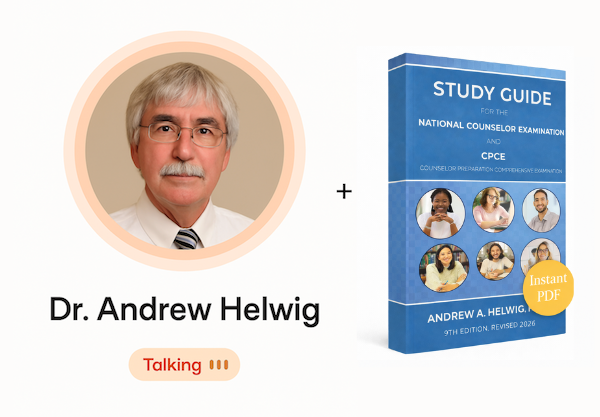I have been helping counselors and graduate students prepare for licensure, certification, comprehensive exams and state school counselor certification exams since 1990. As a professor in Counseling Psychology and Counselor Education for many years, I have taught five of the eight content areas on the exam, developed study materials, and conducted over 245 workshops to over 4,000 participants in 18 states.
— Dr. Andrew Helwig
Here are some tips and suggestions which may be useful:
1. In preparing to study for the exam, do a pretest, if possible, which covers the same content material which will be on the exam. Score it and determine what your areas of strength and weakness are to help you develop a plan of attack for studying.
2. For the current approximate number of exam questions in each CACREP area of the NCE, see my BLOG Statement of May, 2023. On the Counselor Preparation Comprehensive Examination (CPCE) which many graduate students take, however, all eight content areas are examined equally, i.e., there are 20 questions in each content area.
3. If you have been out of school for a few years, I would establish a two-month study program. Each week I would study a different content area being aware that some weeks more hours will be necessary because you may not be as familiar with the material and/or there may be many more questions on the exam from that area. Or, you could study the first two content areas, Human Growth and Development and Social and Cultural Foundations, which have few questions, in one week and use two weeks for Helping Relationships which has the most questions on the exam.
4. Starting with the second week of study, you need to go back and review the material you studied the first week so you don’t lose it. Each subsequent week, you need to keep reviewing material studied earlier. This re-review should be fairly rapid although you may want to add a few new concepts to that content area you had not studied before. Of course, if you have scheduled yourself for the exam and you have less than two months before you write, you will need to adjust your study schedule accordingly.
5. For most of your study hours, try to use quality daytime hours when you are rested and alert. Schedule study hours on your BlackBerry or in your day timer. Your late night study hours, after the house is finally quiet, may be less effective because of your fatigue.
6. Don’t overwhelm yourself with tons of materials to study that you have gathered from all over including study guides, textbooks, course notes, etc. Many counselors gather so much potential material to study, they become frustrated, angry and immobilized. One common response I receive from counselors who complete my workshop is that they now know what to study, what the “lay of the land is.” Their anxiety is reduced because they have a much clearer picture of what to do and how to get there. We use my Study Guide for the National Counselor Exam and CPCE as our resource for the workshop and they have this one 400-page book from which to study. Furthermore, my Study Guide is very user-friendly. All the content material is double-spaced and outline formatted. It does not look or read like a textbook.
7. The NCE has 200 questions and you are scored for 160; 40 are developmental/experimental and not scored for you. There are many forms of the NCE and typically the cutoff for passing the exam is in the 90s (97, 91, 99, etc.) – out of 160 questions. One hundred questions correct out of 160 is 62.5%. Never has the cutoff for the NCE been higher than 65% correct out of 160 so it is a very passable exam, with your preparation. For licensure, some states convert the NCE cutoff to a 75% or similar number before they will call it a PASS. No one will ever ask you what score you received (except for a colleague perhaps) so there is no particular extrinsic value in scoring very high (although you may have intrinsic reasons to do so). You only need to score high enough to PASS.
8. For those of you taking the national comprehensive exam (CPCE), your passing cutoff score is determined by your university program. The national office from where the exam comes (National Board for Certified Counselors) does not set the cutoff score. Of the 160 questions on this exam (20 in each of the eight content areas), 24 questions are developmental/experimental and not scored for you. Your highest possible total correct is 136 questions.
9. Many of you taking the NCE will take it on a computer. The computer program does allow you to go back and review items, or answer those you purposely skipped the first time through the exam. You will be given “scratch” paper. Also, when you are finished with the exam, you can press the ‘score’ button and find out how you did. The vast majority of you will leave with a very bright smile!
10. In my 20 years of experience preparing counselors for exams, the subgroup of counselors which seems to have the most difficulty are those who have reading/learning disorders or other cognitive impairments. If your disorder is diagnosed by a competent professional, you can request additional time from NBCC for the exam – one to two more hours. You need this approval from NBCC far in advance of the exam.
11. As a final suggestion, let me recommend that you view this entire exam preparation process as a way to make you a better counselor for the clients you serve. It will be a great review as well as the learning of some new material. Resist looking at this process as something you need to do just to pass this “damn” exam.

